 As my husband and I watched our baby moving on the sonogram screen before us, hearing the familiar fluttering that filled the darkened room, we found it nearly impossible to digest what the specialist had just told us. “I advise that you terminate this pregnancy.”
As my husband and I watched our baby moving on the sonogram screen before us, hearing the familiar fluttering that filled the darkened room, we found it nearly impossible to digest what the specialist had just told us. “I advise that you terminate this pregnancy.”
This is my PPROM story and what every woman of child-bearing years needs to know about it.
What is PPROM?
Preterm Premature Rupture of Membranes (PPROM) occurs when the amniotic sac breaks way too early (technically before 37 weeks). Mine broke just before 14 weeks. Yes, you read that correctly. 14 weeks.
Actually, I didn’t even know my water had broken. It wasn’t a huge gush of fluid like you experience with full-term pregnancies; the only symptom I had was faint spotting which led to immediate fears of a miscarriage. So when my husband I went to my OBGYN the next day, I was elated when he told me there was a heartbeat. But what he said next changed my world forever:
“But there’s no amniotic fluid.”
My sweet doctor was very calm, assuring me it was nothing I did to cause this (PPROM happens in about 4% of pregnancies). He advised me to go home, get in the bed for a week because in some rare cases the amniotic sac will reseal on its own. I didn’t have the heart to ask him what happened if it didn’t…
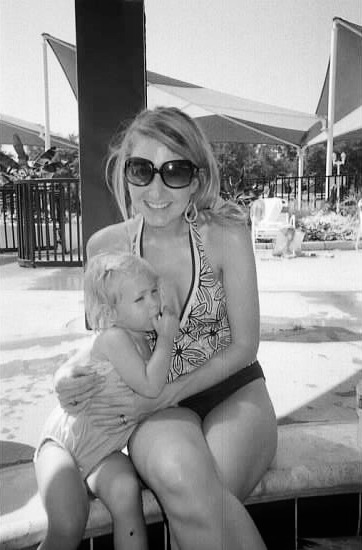
The Standard Medical Response
Fast forward a week and we found ourselves at the maternal-fetal specialist’s office. Our hopeful spirits were crushed when she told us that the sac did not reseal. And the spotting I had experienced was because my placenta had abrupted (probably from the force of the amniotic sac breaking, although they couldn’t say for sure).
She then proceeded to explain to us that just like when your water breaks at full-term you are told to go to the hospital because the risk of infection is high. Well, that same risk of infection is present when your water breaks too early. The amniotic sac is what protects the baby from bacteria and infection. As soon as it is breached it is not a matter of if an infection will come, but when. And when it does, the infection quickly spreads to the mother, who if not treated quick enough, could die.
Besides, the doctor told us, amniotic fluid is what develops a baby’s lung tissue. Even if by some miracle this baby made it to viability (23-24 weeks) without getting an infection, she told us, there would no way the baby could breathe upon birth. She would suffer and suffocate within a few minutes after birth.
And if by some miracle of miracles the baby didn’t die upon birth, she would be horribly disabled (amniotic fluid also allows babies to kick and move and develop muscle tissue) and hooked up to a ventilator, and probably be brain damaged (due to the placental abruption not allowing blood to flow properly to the baby) the rest of her life.
There is nothing to prepare you as expectant parents for this kind of news. But seeing the baby on the screen, hearing the heartbeat pumping away, I could not do as they advised. The specialist and her partner did not agree with our decision not to terminate. But they hesitantly said I could go home, get in the bed, and wait to miscarry or get an infection as long as I agreed to take my temperature several times daily. If I started showing signs of a fever they would absolutely have to deliver the baby because that meant certain morbidity for an under 24 week old fetus and it would only a matter of time before I succumbed, too.
“Pray for a miracle,” one of the doctors said as we walked out, my husband having to hold me up as the weight of the news was almost too much to bear.
A Glimmer of Hope
In our modern age, there seems to be few conditions or diseases without some sort of treatment, medicine, or medical trial. But that’s the case with PPROM, as our friends and family soon learned when they started researching where else we could go in the country or what else we could do to help this baby. Many things have been tried over the past few decades – patches and injecting of synthetic fluid, just to name a few. But all have been proven to actually increase infection rates so are rarely used anymore.
But then I came across a small glimmer of hope.
I found an international PPROM message board (that’s now a private Facebook group). Some of the women were on bed rest, told that their baby wouldn’t survive; others had recently terminated their pregnancies upon the advice of their doctors and were seeking support and answers after their devastating losses.
And then there were a few women on the board whose PPROM babies had survived. Granted, their water didn’t break as early as 14 weeks like my case. But the mother who said her water broke at 18 weeks and posted pictures of her then healthy two-year-old gave me the little hope I needed to get through each day. That and my faith in God, who I believed wasn’t limited by doctors’ predictions or harmful bacteria or my compromised womb.
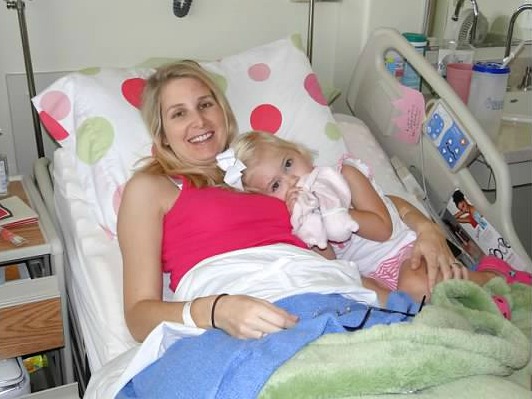
Bed Rest
So on bedrest I stayed. I made it through the first week, then the second. I held my breath every time the doctor put the sonogram wand on my growing belly. I was just as shocked as the doctor when we heard that familiar, fast beating.
In total, I spent 15 weeks on strict bed rest with no measurable amounts of amniotic fluid, the last six in the hospital on the antepartum ward. During that time I only got out of the bed to go to the bathroom and take an occasional shower.
It was by far the most difficult thing I’ve ever done in my entire life. Most women on the antepartum ward were guaranteed a baby in the end if they just followed the doctors’ orders. But that wasn’t the case for me. I was doing all the same things while being told day after day that my baby was probably going to die upon birth . . .
But I did not give up hoping and praying and checking that message board every day for more stories of survival, stories of PPROM babies defying doctors’ expectations.
The Birth
I finally went into labor at 29 weeks, 15 weeks after my water broke, most likely due to an infection. It was an emergency situation as I had been told it probably would be. My placenta – which has been 50% abrupted the entire pregnancy – tore off completely. The pain is something I will never get over. Nor will the way my mom looked at me as they rushed me back into the ER. I seriously don’t think she knew if she would see me or her grandchild alive again that day.
But I had a peace that surpasses understanding about me. I wanted to meet the baby that I had bonded with in those otherwise lonely 15 weeks of bed rest. Even if it was only for a few minutes…
The Baby
In my foggy state, I saw the team of doctors pull the baby out of me and take her to a little room off the side of the OR. The next thing I remember they were wheeling her out of the room, at least five nurses and doctors hovering above and around her, pumping this and administering that.
They didn’t stop to let me see her and I was relieved. Why? That little incubator on wheels whizzing out of the room meant they were going to do at least try to work on her in the NICU, instead of putting her on my chest to die.
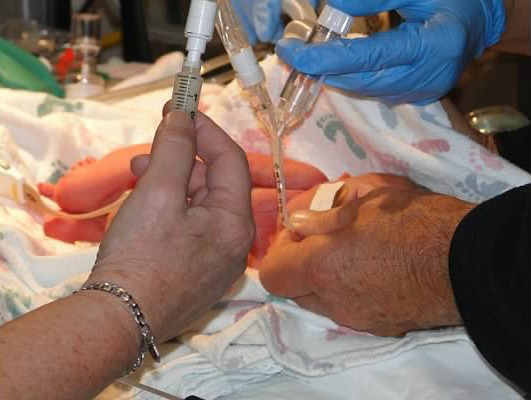
The NICU
The first few hours and days in the NICU were touch and go. At one point, the NICU doctor told my husband we needed to say our goodbyes. But our daughter kept defying odds, hanging on. They put her on a high oscillating ventilator, gave her as many steroid shots as she could take, and everything else they could possibly do to get her lungs to function.
And, you know what, they eventually did. To the surprise of every doctor and nurse.
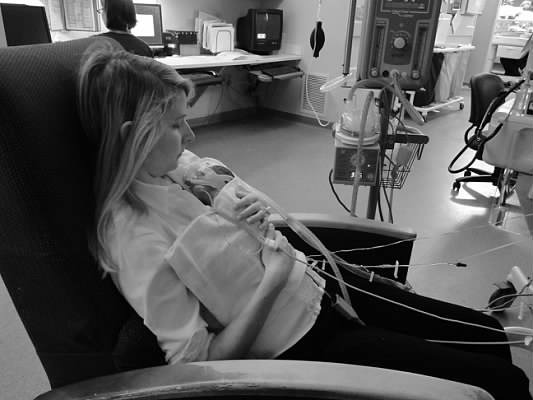
Our daughter spent a total of 2 and a half months in the NICU, which is a very little amount of time considering her story. She came home on supplemental oxygen, has had several surgeries , a feeding tube, and years of therapy for physical issues related to my pregnancy. But today she is a happy, vibrant, and joyful six-year-old, going to a rigorous academic school and defying everything doctors told us what happened to her. It’s nothing short of a miracle. But it’s also a story of hope for other moms experiencing PPROM.
PPROM Awareness
It’s mystifying to me every woman who joins this PPROM Facebook group is told by her doctor pretty much the same thing: there is no hope for their babies and they should terminate immediately because their life is at risk. But what is there is a little hope? Should that change how PPROm pregnancies are treated?
Now I realize my daughter’s story of survival after a PPROM at 14 weeks is rare, especially considering the placental abruption. But since she was born I have read more and more stories from mothers whose water broke at 16, 18, 19, 22 weeks who went on to deliver healthy – albeit premature – babies. Even women who PRROM at 24-26 weeks are sometimes told to terminate, which is crazy to me because there are plenty of former preemie babies I know who were born that early and are living normal, healthy lives today.
It’s obvious that medical journals have not captured these stories quite yet. Below I’ve listed the organizations trying to fund research and educate medical professionals about these PPROM success stories, but awareness is slow. So I humbly ask you to share this with
So I humbly ask you to share this with post with your friends. Maybe there is a pregnant mom out there who has just received the most devastating news, and she is scrolling through google search results for any glimmer of hope or support. Or maybe your have a friend that is an OBGYN or antepartum nurse who might not know that there are PPROM are stories of survival. I would love for our story to be that glimmer of hope and perhaps get the medical community to relook at its standard response to this medical condition.

Little Heartbeats Facebook Group
American Alliance for PPROM Support
BabyCenter PPROM Message Board








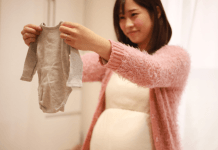





What a wonderful story, so happy to hear your pProm baby is here and healthy! I am also thankful you’re spreading awareness about prom and how many pregnancies do and with healthy babies, despite all of the negative information provided. I have a pprom baby too, I ruptured at 24 weeks and delivered at 32 weeks after eight weeks of bed rest. I was told the same things that you were not to terminate that there is little hope. My pprom baby is now a healthy 7yo.
Here’s a link to my story, I found it and nonprofit to help provide hope to families like ours and others in the same hospital bed rest situation but with Pprom or any pregnancy complication.
http://www.highriskhope.org/who-we-are/our-history/
Founded a nonprofit, not found it:)
Wow, Heather. Thank you so much for sharing this story! I will check out the organization and would love to connect!
Would love that, please email us at [email protected] and I will reply with my contact info.
This is a beautiful story! Thanks for sharing. We lost a child to a ruptured ectopic pregnancy. Your story will go far to encourage a family that receives a PPROM diagnosis.
Thank you, Yolanda, for your kind words. And I am so sorry for your loss.
What a beautiful and inspirational story! Thank
U for choosing life for your sweet girl and allowing God to work a miracle through you!
Thank you, Shelly! I feel privileged to be able to share our story and I hope it offers hope to many.
Thank you so much for sharing your story and raising awareness about PPROM. My PPROM baby will be seven weeks old tomorrow. He is doing great, and we are so thankful for his life.
Holly, that is wonderful news!! Thanks for sharing!
This is exactly what happened to me when I was pregnant for my daughter! My water broke around the 14 week mark & we were told to go home and wait for another miscarriage. We were given a less than 1% chance of having a take home baby but after combined bed rest at home and at the hospital, I delivered a 2 lb 2.5 oz baby girl at 28 weeks 3 days after a placental abruption. She spent 60 days in the NICU and today she is a thriving five year old in kindergarten! Thank you so much for sharing your story!! I searched and searched for other mothers who experienced this when we were going through it and there were not a lot of stories out there. Your girls are absolutely beautiful!
Elizabeth, Thanks so much for your comment. I am so glad to hear of your similar story! We need to get these stories out because I hate to think of all the babies being terminated that might actually have a chance. Thanks again!
Lee – I’m not sure you’ll see this, but my water broken two days ago at 17 weeks. Praying for a similar outcome as yours. Did your little one seem to curl up/scrunch up after the fluid was gone? That’s my big concern right now (besides her lungs of course). I worry about her muscular and joint development without the fluid to move around. Just wondering if you experienced that as well. So glad to read your story…we’re hopeful but also realistic. Thank you.
Lee, you have made my heart so very happy today. Reading you blog and remembering you as the sweet and special friend of our Courtney when you lived in FL only confirmed what determination I knew you had. Thank you for making the right decision and mostly thank you for sharing your love for our maker. You are truly an inspiration! May you continue to be blessed, you will be in my prayers.
With love and hugs,
Martha Andres
A friend of mine read your story and sent it to me this week. Last April, at 15w1d, my water broke with our second daughter. Same story – pessimistic doctors, lots of water, unending bedrest, and an unknown conclusion waiting for us. After 13.5 weeks, Violet was born at 28w3d (2 lb. 12 oz.). She was a fighter and came home after 76 days in the NICU. Aside from on-going physical and occupational therapy, she has no other major or on-going medical complications. She is nothing short of a miracle. I got through everything by reading endless posts on a PPROm Facebook group (PPROM Stories of Hope). Thank you for sharing your story and giving others hope also.
And, best of luck with your current baby. Our mutual connection thought you may be going through a similar situation again. You are in my prayers!
I feel like I’ve read more pPROM studies than my doctors at this point. My water broke at 20w1d and was given the same doom and gloom speech that seems to be the standard… By 5 doctors in my practice. At least they’re consistent right?
I’m 23 weeks today and they still refuse to intervene stated the baby still isn’t viable and I need to make it another week to be admitted. Every single visit I go to it’s another devastating story about loss and how my daughter can’t possibly survive this. It’s heartbreaking and very difficult sometimes to keep going, but what choice do I have right? As long as I feel her little kicks, that’s all the motivation I need.
Thanks for sharing your story. I pray I’m lucky enough to have one too.
Lee, a friend just shared this post with me and I connected so much with your story. On January 6th of this year I PRROMed at 18 weeks. I spent 13 weeks on bedrest (10 in the hospital) and 13 weeks with our baby in the NICU/Special Care. Our sweet boy came home on July 5th and he is doing very well considering his rough start. Our OBGYN group (a well-know group in Dallas), told us that Rhett’s experience will change the way they practice medicine and handle PPROM in the future. Praise God that he has used this horrible situation to bring life and hope! Thank you for sharing your story!!